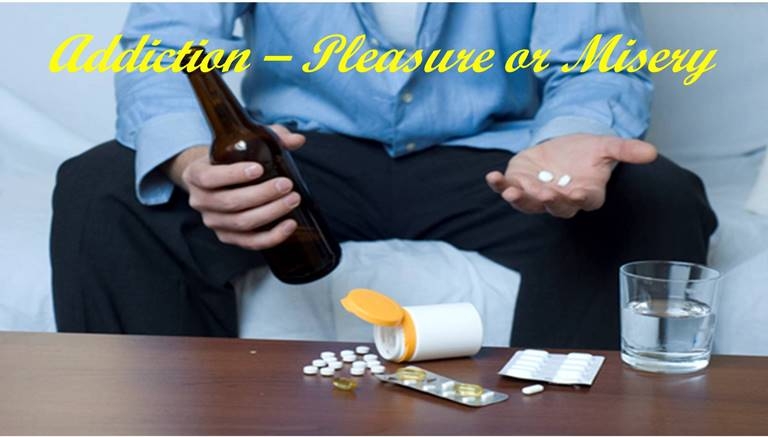02 Apr 2015 Addiction – Pleasure or Misery?

Recently, I found an article published by Harvard Health Publications, which explains what happens in the addicted brain. Although addiction is not within the scope of our work, it is closely related to the Habit Loop which we discuss in our Guided Change Program. Hence, I decided to summarize the content of the Harvard article and bring it to our readers.
Definition:
Addiction is defined as an intense craving for a substance or a behavior, loss of control over its use or conduct, and continuing involvement with it despite adverse consequences.
Addiction is a chronic disease resulting from changes in the brain, much like Alzheimer’s or Parkinson’s.
Consequently, addiction cannot be cured by applying disciplinary measures on the addicted person, or by asking him/her to muster their willpower to conquer the habit.
Types of Addiction:
Addiction may involve substances such as alcohol, drugs, certain medicines, and nicotine. Addiction may also involve certain behaviors such as gambling, eating, sex, shopping, and the internet. Scientists have discovered recently that these behaviors can have as strong a grip on the brain as the drugs.
With the advent of technologies such as functional Magnetic Resonance Imaging (FMRI), scientists have been able to determine that although addictions to different substances or behaviors may appear different, they have a common way of manifesting themselves in the brain.
The Pleasure In Addiction:
Addiction is rooted in two systems of the brain: the pleasure system and the learning and memory system.
The pleasure system of the brain resides in a small cluster of neurons called the nucleus accumbens, situated deep inside the brain.
The evolutionary purpose of the pleasure system is to help all beings with self-preservation and reproduction. Hence the brain is designed to give us pleasure when we eat and when we have sex.
The brain processes all pleasures the same way, irrespective of their origin, be it a drug or a pleasurable behavior.
When the brain experiences pleasurable activities, the chemical dopamine is released in the nucleus accumbens. The neurons in this pleasure center transmit signals to other systems of the brain that memorize the pleasure and the activities that produced it.
When the brain is exposed to drugs or alcohol, it produces a large quantity of dopamine very quickly. This onslaught of dopamine is much greater than the quantity released when we experience the “normal” pleasurable activities of life.
Since the brain is not designed to handle such a flood of dopamine, the neuronal receptors which are designed to respond to the dopamine, gradually die down. And so, to produce the same amount of pleasure the brain requires greater quantities of dopamine and hence greater quantities of drugs.
This change in the neural function of the brain’s pleasure system drives our ever-increasing craving for the drugs and the addictive behaviors needed to satisfy the craving.
Although we have been talking about the effect of drugs, the brain responds in the same way to alcohol, smoking, and the excessive pleasure-producing behaviors such as gambling, eating, sex, shopping, and the internet.
Learning and Memory:
Scientists say that the surge in dopamine alone cannot foster the long term addictive behavior.
Repeated exposures to the pleasure resulting from the drug or behavior, cause the brain to learn and memorize the association between the cue that triggers the behavior, the behavioral routine, and the resulting pleasurable reward.
This learning process involves the areas of the brain called the hippocampus (responsible for learning and memory) and the amygdala, which provides the emotional tag associated with the pleasurable experience.
Over time the reward anticipation area of the brain creates a conditioned response, the intense craving response that occurs whenever the person experiences the cue that reminds him or her of the pleasure that will follow the drug or the behavior.
Recently scientists discovered that the interaction between dopamine and another neurotransmitter, glutamate, is responsible for the learning and memorization process that takes place. But much more research is needed to understand exactly how these interactions work.
Old Habits Never Die:
The, unfortunately, the reality of addiction is that once the cue-behavior-reward process is memorized by the brain, the neural connections representing that addictive behavior never really die.
Even after years of abstinence, exposure to the old cue can bring about a relapse. For example, driving near a favorite bar or meeting a dealer you have not seen in years can cause an instantaneous resumption of the old behaviors.
Overcoming Addiction:
Experts say that overcoming addiction is possible, but exercising self-control is not really the answer. Naturally, the addicted person has to desperately want to overcome the addiction. The secret lies in learning new behaviors that will produce new rewards, which the brain will learn and memorize over time. At the same time, the person has to be extremely vigilant in avoiding exposure to the old cue that triggered the addictive behavior. And this includes not only external cue like meeting an old drinking buddy or the old dealer but also internal triggers like stress and anxiety.
To Learn More:
To learn more about addiction and how to overcome it we recommend that you refer to the Harvard Mental Health publication, among many other resources which you can find on the internet.
Understanding Addiction, Harvard Health Publications, http://www.helpguide.org/harvard/how-addiction-hijacks-the-brain.htm
The Addicted Brain, Harvard Health Publications, http://www.health.harvard.edu/mind-and-mood/the_addicted_brain



